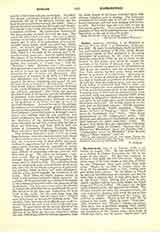

Kochanowski, JAN, b. at Sycyna, 1530; d. at Lublin, August 22, 1584. He was inscribed in 1544 as a student in Crakow University, but left on account of the plague. We find him studying at Padua in 1552 under the best instructors. There he wrote many of his Latin elegies in imitation of Tibullus and Propertius; these early works have little value. Thence he travelled to France, where he lived till his mother’s death in 1557, writing more and better Latin poetry. On his return to Poland he received his inheritance of Czarnolas, and was for some time a courtier, first of some great lords, then at the Royal Court. During this period he produced, together with his best Latin elegies, his Polish songs and Fraszki (trifles). The former are the first really inspired poetry that appeared in Poland. The Fraszki, comical and witty but sometimes coarse, are very instructive, showing what social life was at that time. His “Zgoda” (Concord) and the “Satyr” are political in subject. Weary at last of court life, he retired to his estate. There he wrote “Proporzec” (The Standard) and “Wrozki” (Omens—in prose). This latter was a pamphlet warning Poles against future dangers and dissensions. He began his metrical translation of the Psalms, wrote more lyrics in Polish and Latin, and the poems “Dziewoslab” and “Sobotka” (description of certain old Polish customs). He is believed to have married about 1574. After Henry of Valois’s flight from Poland, Kochanowski wrote two short Latin poems: the ode, “In Conventu Stesicensi”, and “Gallo Crocitanti”, the latter being a reply to an attack on Poland by the French poet, Philip Desportes. King Bdthori was Kochanowski’s hero, and most of his verses henceforth are full of political allusions to his reign. His “Odprawaposlow” (The Envoys Dismissed), dramatic in form, urged the nobles to fight Russia. In 1579 his “Psalter” was complete, written in a most beautiful style, and in 1580 appeared his last and best work, the “Treny” (Lamentations), after his little daughter’s death. Kochanowski is the first true poet of his nation in point of time, and first, too, in excellence until Mickiewicz. The representative of the Polish chivalry and civilization of his period, for his fellow countrymen he is truly great, having created poetry and made it a gift to his nation—which none but the greatest could do. In religion, though influenced by Protestantism and the humanistic trend, he never ceased to be a Catholic, even when attacking the morals of priests and popes. He distinctly declares that disunion in religion would imperil the country, and bade innovators “go to Trent”.
S. TARNOWSKI

